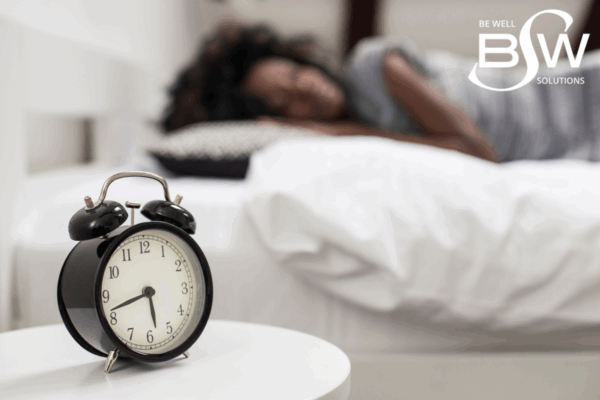Most of us have experienced stress that interferes with rest and causes sleepless nights. Whenever we don’t get adequate quality sleep, it increases our stress level, and the cycle continues. A study by the American Psychological Association1 found that “Adults with high stress are more likely to say they are not getting enough sleep because their minds race (49 percent vs. 10 percent of adults with low stress).” They also stated that the effects of poor or lessened sleep included feeling more sluggish, irritable, sad, depressed, and having more difficulty concentrating. Break the cycle and improve your sleep quality by incorporating the tips below.
Create a Bedtime Routine
Creating a bedtime routine that you follow consistently can help prepare your mind and body for restful sleep. Aim to begin around the same time each evening. Start by prepping for tomorrow. Complete any last-minute chores, finish food prep, and set things out to have them ready. Next, observe your schedule and priorities for the next day. Calm your thoughts by making a physical list to alleviate the need to remember everything. Before jumping into bed, wind down with relaxing and screen-free activities. Finally, prepare your sleep space to be clean, comfortable, and tailored for rest.
Incorporate Mindful Activities
Mentally prepare your body for sleep with mindful activities. These practices ease restless thoughts that can keep your mind racing.
Deep Breathing. Turning your attention to focused inhaling and exhaling can help calm your thoughts while slowing down your breathing and heart rate. Try a common deep breathing exercise like 4-7-8 Breathing or Box Breathing.
Journaling. Writing down your thoughts and reflections from the day can ease worried or anxious thinking. Instead of dwelling on past events or nervously anticipating future concerns, journaling allows you to acknowledge these feelings on paper without keeping track of them in your mind. Start with simple writing prompts or anything that comes to mind. Keep the journal near your bed so you can write down any last thoughts or tasks before preparing to sleep.
Practice Physical Relaxation
Physically relaxing activities will help calm tense muscles that can keep you tossing and turning at night.
Progressive Muscle Relaxation. Guided meditation with progressive muscle relaxation can help relieve tense muscles while giving your mind a moment of relaxation. You’ll practice tensing specific muscles one at a time and then allowing them to release. This mindful check-in can show you where additional attention is needed for muscles that still feel tense.
Stretch. Ease your muscles by incorporating a full-body stretching routine before bed. This practice can help with muscle tension and night cramps. Choose easy stretches rather than a full workout right before sleeping. Don’t hold your breath while stretching. Instead, breathe deeply and rhythmically to provide the most relaxation.
Turn Off the Screens
Screen time before bed can affect sleep in various ways. The blue light emitted from TVs, phones, tablets, and computers can disrupt your body’s ability to fall and stay asleep. Scrolling through social media, movies, and television shows can evoke emotions that enhance stressful feelings and keep you lying awake. Screen time can be overstimulating before bed and typically encourages us to stay awake longer than planned. The Sleep Foundation2 recommends turning off screens at least an hour before bedtime for the best transition into sleep. Use your screen-free time to build relaxing habits that calm stressful thoughts and encourage a restful night of sleep
Continue Reading July 2025 Newsletter: The Dos and Don’ts of Summer Grilling | Tips for a Nutritious Cookout

